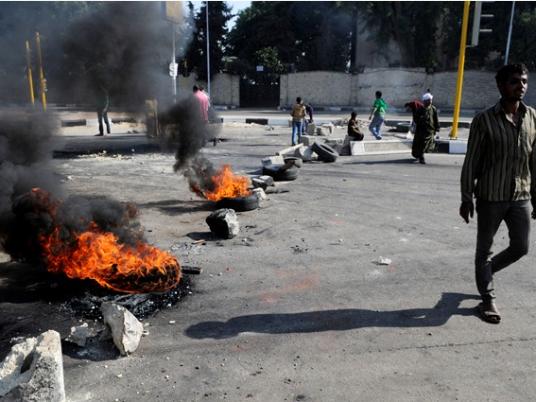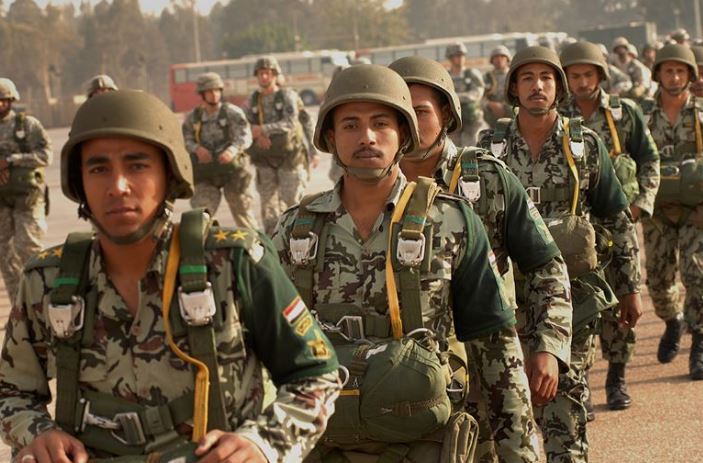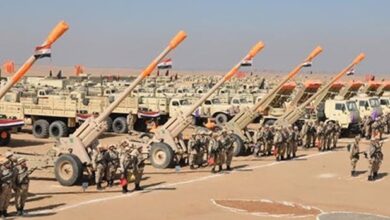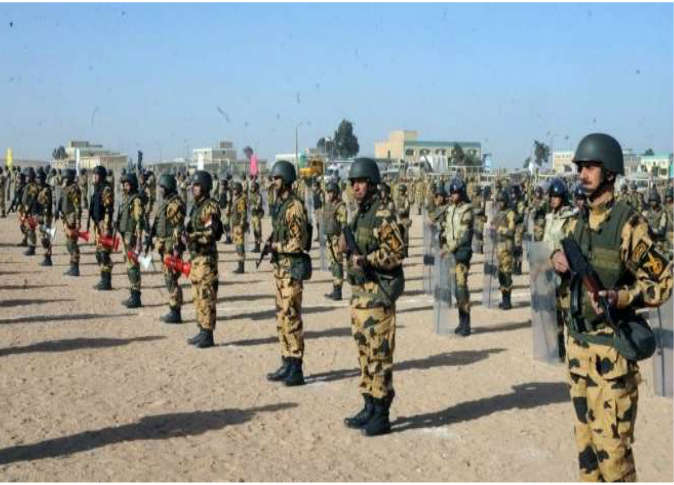
Located in the midst of a favorable spot in the Nile, the Qursaya Island was the spot chosen by hundreds of activists back in 2007 to spend their New Year’s Eve. The event was a way to raise awareness about the embattled island, whose residents were threatened with eviction by the army back then.
The festive mood at dusk that day runs in stark contrast to dawn last Sunday, when the residents of the island woke up to what they described as the sound of war. The Egyptian Armed Forces were storming what is the home of some 5,000 farmers and fishermen, in an attempt to evict them from the island, again.
At least two citizens were killed as a result of the violence that ensued, and tens were injured, including soldiers. Some 25 residents have been arrested and are being investigated by the military prosecutor.
Military spokesperson Ahmed Mohamed Ali said that the army is registered as the owner of the land at the notary office, a claim disputed by residents who displayed court orders suggesting otherwise. In 2008, the residents won an administrative court ruling in their favor, turning down a ministerial decree to evict them. The earlier eviction attempt took place when military bulldozers and troops stormed the island in 2007, prompting a media campaign by the island’s residents and activists in solidarity with them.
Damage and grief
In the renewed assault on the island, some homes were damaged, and angry residents showed a group of reporters doors that were clearly kicked in.
Soldiers were crying out “God is great” as they charged, firing guns in the process, many residents said. One compared the invocation to “fighting a holy war against Israel.” Another, representing the astonishment over what is seen as unprovoked and disproportionate violence felt by many, asked, “Isn’t the army supposed to protect us?”
Mohamed Mahmoud Abdel Moati, a 26-year-old carpenter whose family owns a plot of land on the Giza island, said he saw soldiers get off boats onto his land. “My nephew was standing on the border of our land. They asked him to leave, which he refused. Then they tasered him and took him.”
When his nephew, Ahmad Abdel Moati, 30, pleaded with them to release him, soldiers threatened to arrest him as well.
Magdy Youssef, whose brother Maher is also in custody, said the army arbitrarily took people from their homes in a campaign to terrorize them. “They also burned plots of land and farmers’ huts,” he said.
“They first shot Mohamed Abdu [Abdel Mawgoud] in his leg. He jumped into the water to escape, and then they shot him in the stomach, after which he died,” said Alaa Kamal, his 25-year-old cousin.
Ali, the military spokesperson, in the meantime claimed that Abdel Mawgoud was found dead at 11 in the morning on Sunday by residents, not commenting on the cause of death.
“Even if it were true that they own the land, they could have politely asked us to leave or resorted to the courts. Instead, they come in with an army without warning and kill at dawn,” remarks Nageh Hassan Mohamed al-Sayed, 61.
The death of Abdel Mawgoud is a loss deeply felt in the community.
His brother was consoled and restrained by relatives, who were afraid he would jeopardize their claim by attacking the police officers who were present at the scene.
When his brother’s body arrived in a coffin, hysterical crying filled the air. His relatives, who were weeping, jumped onto the car transporting the coffin. As the car left again, Abdel Mawgoud’s brother cried, “I want to see my brother.”
Eviction for business
Community members believe this suffering is inflicted on them for the sake of businessmen who are eyeing the valuable island and are seeking to transform it into a cash generating tourist hub, equating the army with a militia under the command of businessman and formerly ruling National Democratic Party figure Mohamed Abul Enein, who owns a villa on the island.
Residents wondered why the army is not confiscating his land, but instead chooses to protect it.
Mohamed Abla, an island resident and a visual artist explained that in 2007, Abul Enein tried to “pave the way for businessmen to buy up the land by turning to the army for help.” When a similar attack by the army took place then, Abul Enein was pleading with people not to resist the army and “give them whatever they want.”
It was clear then, he explained, that the army was doing this to give the land to wealthy developers. “Now we don’t know in whose name the army is attacking us,” he added.
Abla said he arrived on Sunday morning, only to find a community member dead, destroyed homes and burning fields.
Zeinab Abul-Magd, a professor of Middle Eastern history at the American University in Cairo and Oberlin College, and a researcher of military economic activities, cast doubt over the military’s claim over the land. “The Armed Forces by law have the right to control any piece of land in the country that is not owned either by the state or private owners for security purposes.” This is not applicable here since there is an administrative court ruling reinstating the farmers’ rights to their land.
According to the farmers, Abul-Magd explained, the army overlooked the court order and went to register the land as its property. Residents accordingly filed complaints at the Board of Grievances, to no avail. “Another suspicious matter is that the army usually does not register lands under its name, but just controls land by the above law. It looks very strange that the military did this with this particular piece of land a few months after its inhabitants gained property rights to it,” she said.
“It’s a profitable area that the military likes to keep full control over,” Abul-Magd said, adding that the island is located in the Maadi Corniche, a lucrative area that is almost fully occupied by military clubs, wedding halls and a supermarket owned by the military.
Residents react
The residents have established a history of resistance to attempts at evicting them, and Sunday’s incident only revived this history.
In a response to the army attack Sunday, they cut off Bahr al-Azam Street, the main road just off the island, paralyzing traffic for hours by placing burning tires on the road.
Some residents demanded the resignation of Abdel Fattah al-Sisi, the head of the Supreme Council of the Armed Forces. Most, however, said they would open up the road once their relatives were released and those responsible were prosecuted.
A crowd gathered around Mohamed Ali Abu Qomsan, a 50-year-old farmer and fisherman, who angrily proclaimed: “I will hit whatever coward leaves this road. We’ll sleep here if we must.”
Abu Qomsan and others expressed a deep distrust of the political establishment. “Forget about political parties, we don’t affiliate with any here,” he said. “We have 15,000 people here; we are a party of our own.”
His son Amr Mohamed Ali Abu Qomsan, who is among the injured, was shot in the hand.
Of the approximately 400 people who were blocking the road, many were not from the island itself, but lived across from it. Most island residents have relatives and friends living around the island, who came in a show of solidarity.
“The government better take action, because the country is an erupted volcano. If they don’t, it will be war,” warned Sayyid Mohamed, a 30-year-old salesman. Mohamed was referring to the clashes not as an isolated incident, but placed them in the context of the many crises the country faces.
“Over 50 young children died in the bus-train collision, there is a war in Gaza. There are priorities! Don’t add to the crises you already have,” he says, directing his message to the Egyptian authorities.
On a day of national grief, Saturday, more than 50 children died when their school bus collided with a train in the Upper Egyptian city of Assiut. Just across the border, Israeli raids have killed more than 100 in the Gaza Strip.
In the afternoon, for an hour, residents opened up the road to give the army a chance to meet their demands. When no action was taken, tires were set on fire again.
Several Central Security Forces trucks lined up on Bahr al-Azam Street, expected to confront the residents cutting off the road, did not get into action. Before they did, residents agreed to open up the road upon promises that their relatives would be released. The military, however, did not keep its part of the bargain and extended the detention of 14 residents by 15 days.
“This is their democracy for you, they shoot us and we are taken to military courts. This will become like Syria, we are dogs to them,” Abu Qomsan added.
This piece appears in Egypt Independent's weekly print edition.




